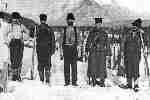
|
Work party from the Otter Creek internment camp, British Columbia, 1916. |
Prof. Lubomyr Luciuk criss-crosses Canada these days, badgering politicians and nabbing journalists in an attempt to right what many Ukrainian Canadians contend is one of the great injustices of the First World War.
The 36-year-old Queen's University academic was in the office a day or so ago, and his articulate and moving plea for the voices of the dead and the few living but maligned to be heard was compelling.
The story is a tearjerker. Before war broke out in 1914, Ottawa urged Ukrainians to come to Canada. They had all the attributes needed to break up wasteland and turn it into prosperous farmland. Deeply religious and with strong family ties, they had muscle, courage and determination. That they couldn't speak English didn't appear to matter. They were an asset to a youthful nation reaching for maturity.
When war erupted, panic and a fear of foreigners set in. The Ukrainians came from territories then both Crown lands of the Austro-Hungarian empire. While 60 per cent of the 170,000 Ukrainian immigrants already had obtained British nationality and others were in the process of doing so, Ottawa suddenly fingered them as enemy aliens. Classed as Austrians or Hungarians and speaking English only poorly, if at all, they couldn't protest the error. Some 5,000 saw their property and belongings confiscated and were shipped off to 26 internment camps dotted throughout the country. Many were held until 1920.
The camps were terrible places. Placed behind barbed wire, the innocent suffered the brutality of the guards and were often used as what amounts to slave labor. There were suicides and mental breakdowns. Some were shot while attempting to escape.
Even those not in the camps were browbeaten. Almost 90,000 Ukrainian Canadians were forced to register as enemy aliens and carry identification passes. This roused suspicions among other Canadians. If the government said they were untrustworthy, what might they do in the community? Families disintegrated and in those days with little social assistance their fate was terrible too.
It need never have happened. The British Foreign Office twice told Ottawa the Ukrainians were no menace and should be given "preferential treatment as friendly aliens." Indeed, many Ukrainians, especially those who could speak English, fought for the allies. One, Cpl. Filip Konowal won the Victoria Cross.
Since the mid-1970s, the Ukrainian Canadian Committee has been urging Ottawa to offer symbolic redress for internment camp inmates. Luciuk, a respected historian, is part of that campaign.
The Ukrainian community isn't asking for very much.
"We don't want Ottawa to apologize for something done so long ago. We don't feel Canadians of today should shoulder guilt for the sins of yesterday. Our basic demand is an acknowledgement that between 1914 and 1920, a wrong was done to citizens of Ukrainian origin."
Although the federal government coughed up substantial compensation packages for Japanese Canadians interned during the Second World War - the bill for which eventually may top $500 million - Luciuk and his committee don't see financial compensation as a priority. Most inmates are now dead, the rest aren't interested in battling Ottawa for dollars.
"What we would like is symbolic redress. 'Just get it in the history books,' is what I hear from most aging inmates."
Another sensible and appropriate idea is to erect a monument at the site of the Castle Mountain camp in Banff National Park.
Yet, after initially paying lip service to the campaign, federal officials have gone into hiding.
It's all very sad. And very unnecessary.
![]() Return to Righting An Injustice Page
Return to Righting An Injustice Page
![]() Return to Internment of Ukrainians in Canada 1914-1920 Page
Return to Internment of Ukrainians in Canada 1914-1920 Page
![]() Return to Ukrainian History Page
Return to Ukrainian History Page
![]() Return to InfoUkes Home Page
Return to InfoUkes Home Page
Document URL: http://www.infoukes.com/history/internment/booklet02/doc-047.html
Copyright © 1994 Ukrainian Canadian Civil Liberties Association
Copyright © 1994 Lubomyr Luciuk
We acknowledge the help in the preparation of this document by Amanda Anderson
Page layout, design, integration, and maintenance by G.W. Kokodyniak and V. Pawlowsky
Copyright © 1996-1997 InfoUkes Inc.
E-mail: internment@infoukes.com
|
since Mar 1 1997 |
InfoUkes Inc. Suite 185, 3044 Bloor Street West Etobicoke, Ontario, Canada M8X 2Y8 Tel: (416) 236-4865 Fax: (416) 766-5704 |
Originally Composed: Tuesday December 3rd 1996.
Date last modified: Thursday October 30th 1997.